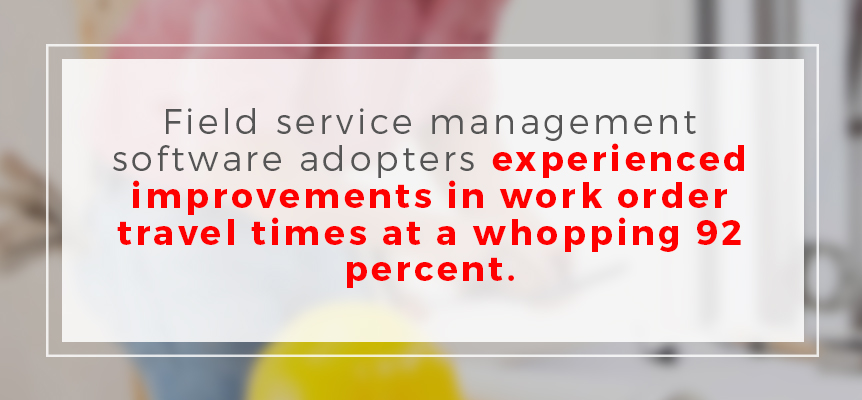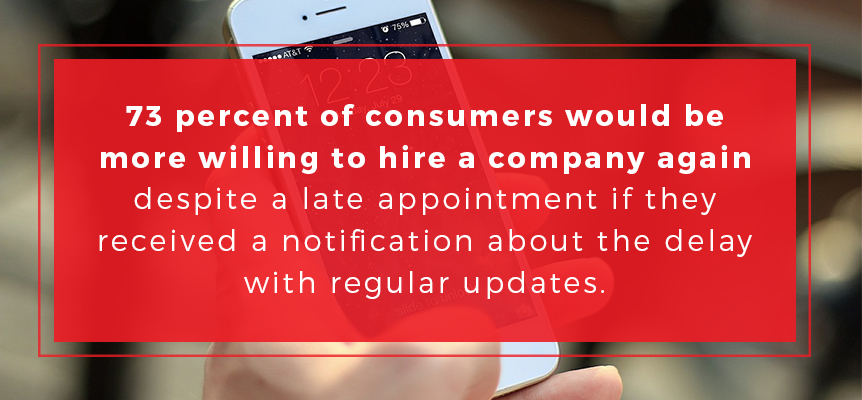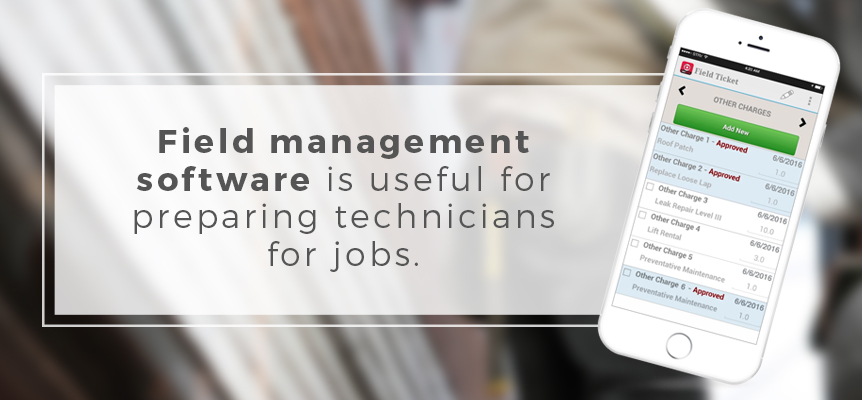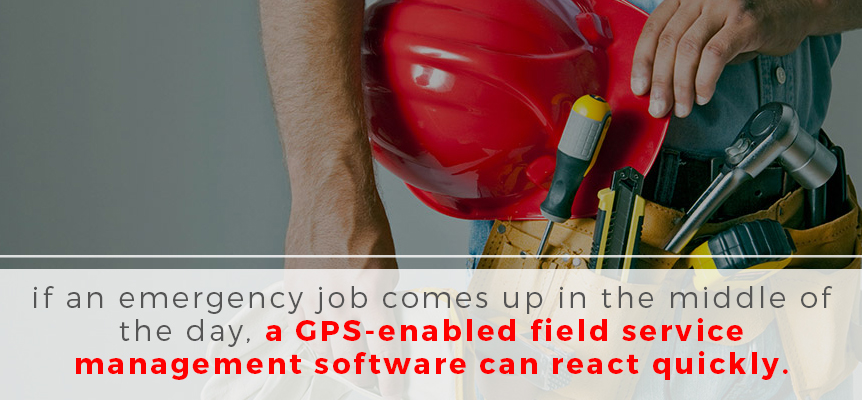![]()
When you’re working in the field service industry, finding innovative ways to improve your business’s functionality and customer service is one of the biggest priorities. While improved functionality and efficiencies keep costs down and workflows running smoothly, maintaining great customer service builds customer relationships and improves your repeat business and reputation. However, maintaining customer satisfaction in this industry is hardly an easy task.
Keeping customers satisfied is always tricky, especially in a field where field service wait times are inevitable, and your competition is only a Google search and a few clicks away from stealing your clients. Waiting around for a technician to arrive is the biggest pain point for customers, and, although they are willing to tolerate some amount of waiting, there is such thing as too long of a wait.e

Of those polled in a Software Advice consumer survey, 67 percent indicated that they would never do repeat business with a company if a technician is over one hour late. Of that 67 percent, 11 percent said 15 minutes late was their cutoff, 25 percent said 16 to 30 minutes late was their cutoff and 31 percent said 31 to 60 minutes late was their cutoff.
With such strict expectations, quoting clients accurate wait and service times can make or break a field service business. However, a lot goes into accurate wait times — the technician’s schedule and progress, efficient job routing and their preparedness, among other things. These are all directly related to a field service company’s business workflows. On all these fronts, field service management software can help.
Quality field service management software is one of the best ways to keep your operations running smoothly and provide field service technicians the tools they need to reach customers faster. Field service software with GPS tracking capabilities tends to offer quality solutions for field service businesses.
By tracking the locations of technicians, GPS tracking field service software help field service companies improve their technicians’ use of company time and improve customer experiences. How exactly can GPS tracking improve the way your business manages field service technicians and satisfies your customer base?
The Benefits of GPS Functionality
![]()
GPS tracking integration for field service operations gives businesses an edge in the industry. With location data, businesses can track both their technicians in the field and the locations of their customers, integrating this data into their database to achieve new levels of business planning and visualization. A few of the capabilities GPS-equipped software can give service businesses include:
- Providing real-time routing based off traffic data
- Automatically sending customers arrival time updates
- Encouraging safe driving among field technicians
- Allowing technicians to schedule more jobs as time allows
- Visualizing current technician locations, so workers, customers and managers stay informed
These capabilities lead to incredible benefits for field service providers that are felt by both customers and technicians.
1. Reduced Travel Times and Arrival Windows
Mapping out effective routes can be problematic with manual methods. With a GPS-enabled software, however, it’s easier than ever. Field service management software with GPS tracking comes with the ability to map out the most effective and efficient daily routes for technicians, based on the location of a job within a region.
As an example, say a worker has four jobs in a work day — the GPS-enabled system analyzes the locations of those jobs, along with the predicted work time to complete them, and compares the data with locational information and traffic reports. This data is then used to develop the most efficient route for the technician, one that minimizes travel times and avoids unnecessary traffic. This route then determines the technician’s schedule for the day.
With this data-based route, technician travel times are demonstrably reduced — a majority of polled field service management software adopters experienced improvements in work order travel times at a whopping 92 percent.

Travel time isn’t the only thing that improves with GPS-enabled field service management software. Arrival windows are also more accurate. By using traffic data on top of predicted work order completion times, a GPS-enabled software enables field service companies to reasonably predict the arrival time of a technician within a very narrow window.
2. Improved Technician Punctuality
With more efficient routing and scheduling, GPS tracking makes it easier for technicians to keep to their schedules. 95 percent of businesses polled stated they saw a noticeable improvement in their technicians’ punctuality after adopting field service software with GPS tracking capabilities, and 90 percent saw the number of work orders completed on time increase.
![]()
Much of this has to do with more efficient business processes associated with field service management software, including intelligent routing and scheduling and improved preparation and communication with the home office. Additionally, punctuality allows technicians to stay on schedule throughout their work day.
GPS tracking allows an organization to keep updated on a worker’s progress through their day. This monitoring is essential for identifying when a scheduling problem might occur. If a technician is running a little late on a work order, for example, the organization can either give the next customer a courtesy call to notify them of the delay or even assign a new technician to the job.
Some software will even reassign a technician automatically if another is running behind on their schedule. Both options help improve the company’s overall perceived punctuality.
3. Improved Technician Accountability
A field technician’s workday can be complicated enough that some things fall to the wayside. Reckless driving, forgotten clock-ins and other issues are common problems seen in the industry. Fortunately, GPS-enabled systems can help with both. These systems provide a field service operation’s back office with real-time alerts about technicians’ whereabouts and driving habits so the back office can take note.
In the case of reckless driving or improper use of a company vehicle, a GPS-enabled system can flag a technician if they are speeding or if they are leaving their predetermined route. This enables the company to correct problematic driving behaviors in their employees and identify inappropriate use of company property, which both minimize the likelihood of vehicular accidents and reduce costs.
GPS-enabled field service management software makes it easy to pinpoint clock-in and clock-out times for jobs, which can both mitigate problems when technicians forget to log job times and prevent fraudulent time cards from passing through the system. Some systems even automatically clock employees in through their field service management and GPS-enabled mobile devices.
4. Reduced Vehicular Costs
Field service technicians are, by the nature of their jobs, mobile as they go through their workday. Most require the use of a vehicle to travel from one job to the next, and vehicles require regular fuel and maintenance. Both fuel and maintenance costs can add up over time, especially in months where gas prices fluctuate. However, with GPS-enabled field service management software, businesses can keep their vehicle-related costs to a minimum.
Some of these points play into improved technician accountability issues. For example, enforcing proper driving habits both creates accountability and reduces vehicular costs by reducing the likelihood of an accident and prolonging the distance traveled on every gallon of fuel. Aggressive and otherwise reckless driving can lower gas mileage by as much as 30 percent on the highway and 40 percent in town, which adds up to wasted revenue.
GPS software utilizes intelligent routing to create more efficient work routes for technicians. These routes not only minimize drive time for your technicians, but they also decrease the number of miles your technicians need to drive. This reduction in mileage effectively reduces fuel costs, as well as the chances of getting into an accident.
These factors have added up for businesses who have implemented GPS-enabled field service management software in their workflows. Of businesses surveyed, 89 percent of businesses polled saw an improvement in their weekly average fuel costs after they adopted a GPS-based software for their dispatching functions.
5. Sustainability Marketing
Fuel economy doesn’t just mean reduced costs for your business — it means a marketable selling point. Sustainability is a major topic for consumers today, to the point that nearly every industry is feeling the pressure to adopt more sustainable practices and reduce their carbon footprints. Reducing fuel usage by improving your technician’s travel efficiency is one of the best ways to do this for a field service business.

With the ability to track and efficiently route your technicians, GPS-enabled field service management software enables you to not only reduce fuel costs but also to implement green practices into your business. By implementing sustainable practices, you gain a new selling point for your services that won’t go unnoticed.
New and old customers alike will be thrilled to hear about this new dedication to sustainable practices, and you’ll benefit from an improved reputation and increased customer loyalty.
6. Improved Customer Communication
Communicating with your customers is one of the best ways to improve customer satisfaction. If consumers feel like they are in the loop and being consulted on their project, they’re more satisfied with their service. This improved satisfaction rings particularly true if their technician is running late.

Though lateness can kill a field service business’ relationship with a client, most consumers are willing to forgive the tardiness as long as they are notified beforehand. According to a Software Advice poll, 73 percent of consumers would be more willing to hire a company again despite a late appointment if they received a notification about the delay with regular updates.
Businesses agree with this general sentiment. Of the businesses polled in the survey, 76 percent of them said their customers’ attitudes toward tardy technicians improved since implementing a GPS-based field service management system with automated alerts and messaging capabilities.
Before GPS, if a technician were running late for a job, the field service organization and customer wouldn’t know unless the tech called in. With GPS, that’s no longer as much of a problem. A significant number of GPS-enabled field service management systems feature automated alert and messaging functions to update customers on the status of their work order.
These systems accomplish this by geolocating the technician’s mobile device and using the worker’s location to determine the technician’s possible arrival time using real-time traffic information. These alerts are also sent to the business’s back office to inform managers when a technician is running late and give them the opportunity to reach out to the customer.
7. Improved Work Completion
With GPS-enabled software increasing technicians’ punctuality, it only makes sense that this would result in more work orders being completed daily. Businesses who have implemented field service management systems with GPS can attest to this.
Of those service providers polled, 95 percent of them said the average number of work orders their technicians completed on a daily basis improved after they adopted a GPS-based field management system. Furthermore, 90 percent of these business operators said that the number of work orders completed on time increased.
The number of jobs they’re able to complete each day often measures a technician’s success. As such, increases in a technician’s number of completed work orders equates to better performance reviews. It also means improved revenues and satisfied customers for their employer. In combination, these factors result in more successful businesses and more satisfied employees, which both reduce employee turnover.
8. Technician Preparedness

Field management software is useful for preparing technicians for jobs. Between providing technicians with customer data and tracking their available equipment, field service management software can help keep technicians moving and working throughout their days. However, a new level of functionality can be achieved if GPS capabilities are added into the mix.
As field technicians log their daily activity into their mobile field management software, the system tracks the equipment and parts they’ve used and keeps a count of the equipment left in the vehicle. In some cases, this count may leave the technician short for their last few jobs of the day. If this is the case, the software can identify the problem before it becomes an issue.
Using this real-time information, the system flags the technician and notifies dispatchers about the problem so they can assign a new technician to the job and recall the technician in the field for resupply. With a GPS enabled system, the software can both suggest nearby technicians and estimate the arrival time of the new technician while alerting the customer to any delay in service.
Additionally, any technician who shows up to a customer’s location will be prepared for the job with a GPS-enabled field service management system. With this software on their mobile devices, technicians can access customer profiles in the field, notifying them of any special client needs, pets to consider and pertinent work order history.
When the software is integrated with GPS, the system can tag pertinent locations for the technician, like the customer’s address, the location of pertinent landmarks and other information that might be necessary to the job. With all this information about their client, the technician can more easily communicate with the customer and get the job done faster.
This combination of functions reduces the number of times technicians need to return to the office before finishing a job, which in turn cuts down fuel usage. It also improves customer satisfaction by reducing the amount of time needed to complete the work order and prevents costly delays in service.
9. Improved Field Communication

Field service businesses are constantly needing to adjust their schedules for new jobs and customers, which can make management a frustrating and involved task for employees and managers alike. With a GPS-enabled field service management software, however, changes can be made more easily.
For example, if an emergency job comes up in the middle of the day, a GPS-enabled field service management software can react quickly.
The system not only identifies a technician for the job, but the system adjusts priorities, schedules and routes to accommodate the new job, moves technicians around jobs to prevent as many delays as possible and notifies any pertinent customers of potential delays in service, all with minimal human interaction with the system.
Even better, all this information is automatically updated in the system, so technicians can be alerted to the changes immediately and react accordingly.
With this improved communication, field service businesses run more smoothly and maximize both employee and customer satisfaction.
How Field Service Management Software Can Help

The benefits of GPS-enabled field service management software are incredible, adding new levels of functionality to field service businesses that result in more efficient workflows and improved consumer satisfaction. However, some business owners still wonder if they need to switch to field service management software. Why not just use basic GPS tracking and some online maps?
Though businesses can survive well enough without GPS-enabled field service management software, they miss the improved functionalities these systems can bring. On top of the benefits of GPS-enabled field service management listed above, field service management software by itself can improve a business’s productivity and revenues. Of the businesses who did switch to field service management software:
- 90 percent increased the customers they won with their quotes
- 86 percent lowered their fuel costs
- 83 percent had invoices paid more quickly
- 82 percent improved their first-time fix rate
- 79 percent could make more customer visits per day
Businesses that refuse to use field service software can miss out on these benefits and more, spending more time and money to achieve the same results as companies using field service management software.
Get Started with Field Service Management Software from Dataforma
If you’re looking for a quality field service management software with GPS capabilities, Dataforma has options for you and your business.
Dataforma is the largest management software service provider for the construction and field service industries, providing flexible yet powerful software options for construction companies, HVAC technicians, roofers, plumbers, electricians and restoration professionals alike. Our program is formatted in such a way that businesses of all sizes see the best workflows and functionality possible.
Whether you need to process work orders, find customer data, track inventory or schedule jobs, you can do it all with our highly secure yet user-friendly software system. Our field management software is made for the field service industry, with functions allowing your field service business to create, schedule and dispatch technicians for your work orders.
Keep your work flowing while improving communication among your team members, empowering your team while also improving both employee and customer satisfaction rates.
Dataforma has offered valuable services to the field service and contracting industry since 2003. With over a decade of experience under our belts, we know what our customers need to succeed. Learn more about how our software can help you and your business with comprehensive GPS-based functions. Get started by contacting us today to for a free demonstration.










